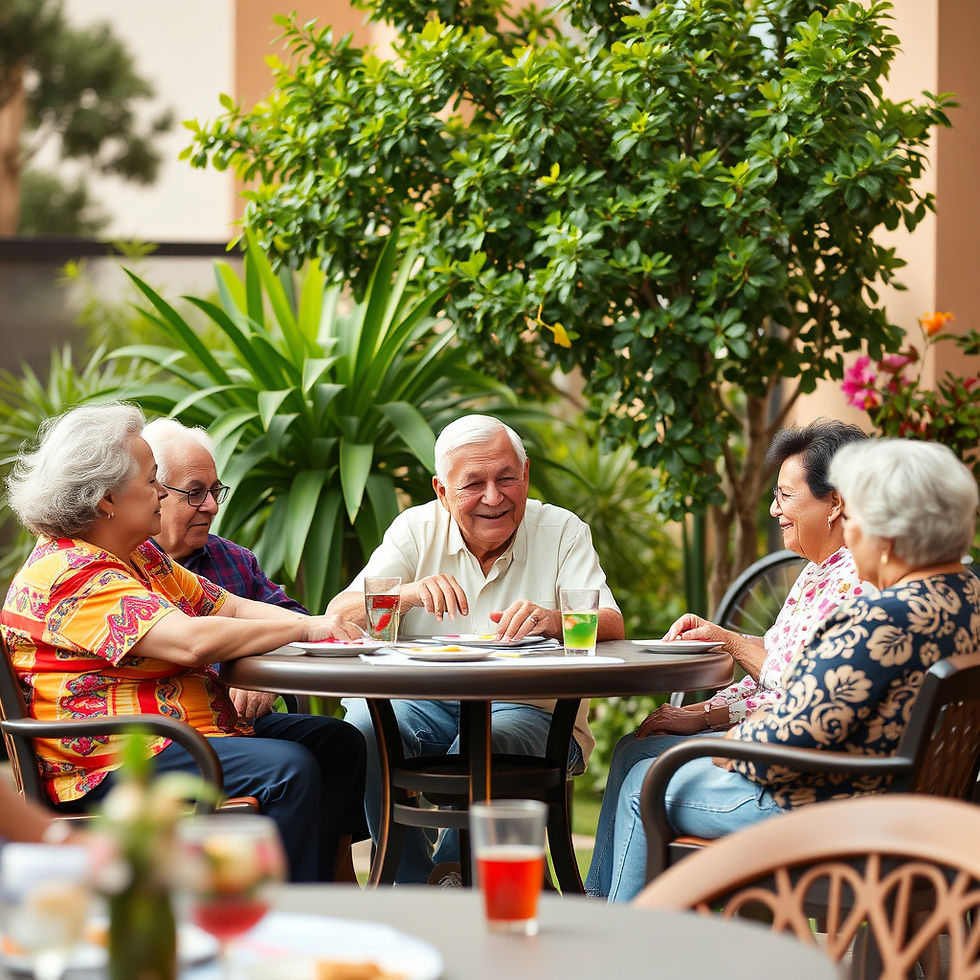Fostering Social Interaction Within the Hispanic Elderly Community
- Sinai Newberry
- Sep 22
- 3 min read
The Hispanic elderly community is a vital and energetic part of our society. However, many seniors in this demographic face significant challenges related to social isolation. As they age, social interaction becomes important for their mental and emotional health. In this post, we will discuss the significance of nurturing social connections among Hispanic seniors and outline practical ways to enhance their social lives.
Understanding the Importance of Social Interaction
Social interaction is fundamental for elderly individuals. It helps to combat loneliness and boosts both physical and mental health. For Hispanic seniors, maintaining cultural ties and community connections is especially beneficial. Engaging with others who share similar backgrounds can foster a sense of belonging and provide invaluable support.
Studies show that social interaction can lead to improved cognitive function and a reduced risk of depression. In fact, seniors who maintain social connections are 50% less likely to experience depression compared to those who do not. Additionally, social engagement can even contribute to a longer life—research suggests that individuals with strong social ties live up to 3.7 years longer than their isolated peers.
Barriers to Social Interaction
Even with these benefits, many Hispanic seniors face barriers that limit their social engagement. Understanding these barriers is critical for addressing them effectively:
Language Differences: Seniors who are not fluent in English may feel excluded in predominantly English-speaking settings. This can lead to feelings of isolation and helplessness.
Transportation Issues: Without reliable transportation, attending social events or visiting family can be nearly impossible. Nearly 35% of seniors report that transportation is a major barrier to social participation.
Health Concerns: Physical limitations, health issues, or cognitive decline can restrict the ability of elderly individuals to engage in social activities, further isolating them.
Cultural Factors: Some cultural norms may discourage seeking new connections, which can prevent seniors from stepping outside their comfort zones.
Creating Opportunities for Connection
To enhance social interaction among Hispanic elderly individuals, we need to create inclusive opportunities. Here are some actionable suggestions:
1. Community Centers and Programs
Local community centers can be excellent resources for social engagement. Programs specifically designed for Hispanic seniors can strengthen ties across generations. Activities like salsa dance classes or traditional cooking workshops not only encourage participation but also foster a sense of community pride.
2. Language Classes
Offering language classes can significantly empower Hispanic seniors. These classes not only enhance communication skills but also serve as social gatherings. For instance, a group of seniors learning English at a community center reported feeling more confident, with 70% expressing that they made new friends through the course.
3. Transportation Services
Implementing transportation services specifically for seniors can help them attend social events. Collaborating with local organizations can provide shuttle services or volunteer drivers, effectively boosting attendance at community gatherings.
4. Technology Training
Equipping seniors with technology skills can open up new avenues for interaction. Teaching them how to use video calls and messaging apps can help them stay connected with family, even if they live far away.
5. Intergenerational Programs
Drumming up intergenerational programming fosters connections between younger and older community members. Activities such as mentoring sessions and storytelling can facilitate strong relationships and enhance mutual understanding.
The Role of Family and Caregivers
Family members and caregivers are essential in supporting social interaction among Hispanic seniors. Regular family gatherings, phone calls, and video chats can help maintain connections and alleviate feelings of loneliness. Caregivers can also encourage participation in community events by organizing outings or providing support as necessary.
Celebrating Cultural Heritage
Celebrating cultural heritage plays a crucial role in promoting social interaction within the Hispanic elderly community. Organizing events that showcase traditional music, dance, and food can create a sense of pride and belonging. For example, annual Hispanic Heritage Festivals can draw large crowds, including younger generations, fostering intergenerational connections and cultural continuity.
Strengthening Our Community Ties
Fostering social interaction within the Hispanic elderly community is essential for improving their quality of life. By understanding existing barriers and creating inclusive opportunities, we can work towards reducing social isolation and enhancing the well-being of our elderly population. Community centers, language classes, transportation services, technology training, and intergenerational programs are all effective methods to encourage engagement.
By emphasizing the importance of connection and community, we help ensure that Hispanic seniors feel valued, supported, and in touch with those around them.


If you know of any seniors in need of connecting with others in Fate,TX please ask them to join us here.



Comments